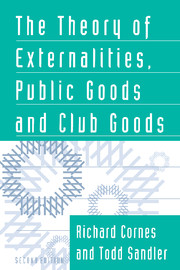Book contents
- Frontmatter
- Contents
- List of tables and figures
- Preface
- Part I Introduction to the theory of externalities, public goods, and club goods
- Part II Externalities
- Part III Public goods
- Part IV Clubs and club goods
- 11 Homogeneous clubs and local public goods
- 12 Clubs in general
- 13 Institutional forms and clubs
- 14 Game theory and club goods
- 15 Uncertainty and the theory of clubs
- 16 Intergenerational clubs
- Part V Applications and future directions
- References
- Author index
- Subject index
13 - Institutional forms and clubs
Published online by Cambridge University Press: 05 June 2012
- Frontmatter
- Contents
- List of tables and figures
- Preface
- Part I Introduction to the theory of externalities, public goods, and club goods
- Part II Externalities
- Part III Public goods
- Part IV Clubs and club goods
- 11 Homogeneous clubs and local public goods
- 12 Clubs in general
- 13 Institutional forms and clubs
- 14 Game theory and club goods
- 15 Uncertainty and the theory of clubs
- 16 Intergenerational clubs
- Part V Applications and future directions
- References
- Author index
- Subject index
Summary
Up to now, we have implicitly assumed that the members have owned and operated their clubs, either using the congestion toll to finance provision or else instituting a two-part tariff when toll self-financing has not been possible. For the case of replicable homogeneous clubs (cells A and B in Table 11.1), we shall demonstrate that a competitive industry in which each firm corresponds to a club will face the same optimality conditions as those indicated in Chapter 11. Thus, there is no necessary reason for member ownership. That is, under ideal circumstances, any of a number of institutional forms can operate a club efficiently. If there are no exclusion costs nor information imperfections, and if there is a sufficient number of replicable clubs to ensure competitive conditions, then single-product clubs will be efficient, regardless of whether these clubs are member-owned and -operated or are firm-provided.
In recent years, studies in club theory have explored the issue of institutional form. A common conclusion has emerged for a wide range of models and analyses. Institutional form matters when exclusion costs exist, information asymmetries are present, competition is imperfect, and/or the club provides multiple products. This list is surely not exhaustive. The choice of institutional form raises many important issues concerning equity (e.g., Brueckner 1989; Glazer and Niskanen in press) and efficiency (e.g., Scotchmer 1994a, 1994b; Sterbenz and Sandier 1992).
The purpose of this chapter is to explore some of the issues surrounding the choices of institutional forms for clubs.
- Type
- Chapter
- Information
- The Theory of Externalities, Public Goods, and Club Goods , pp. 394 - 414Publisher: Cambridge University PressPrint publication year: 1996



